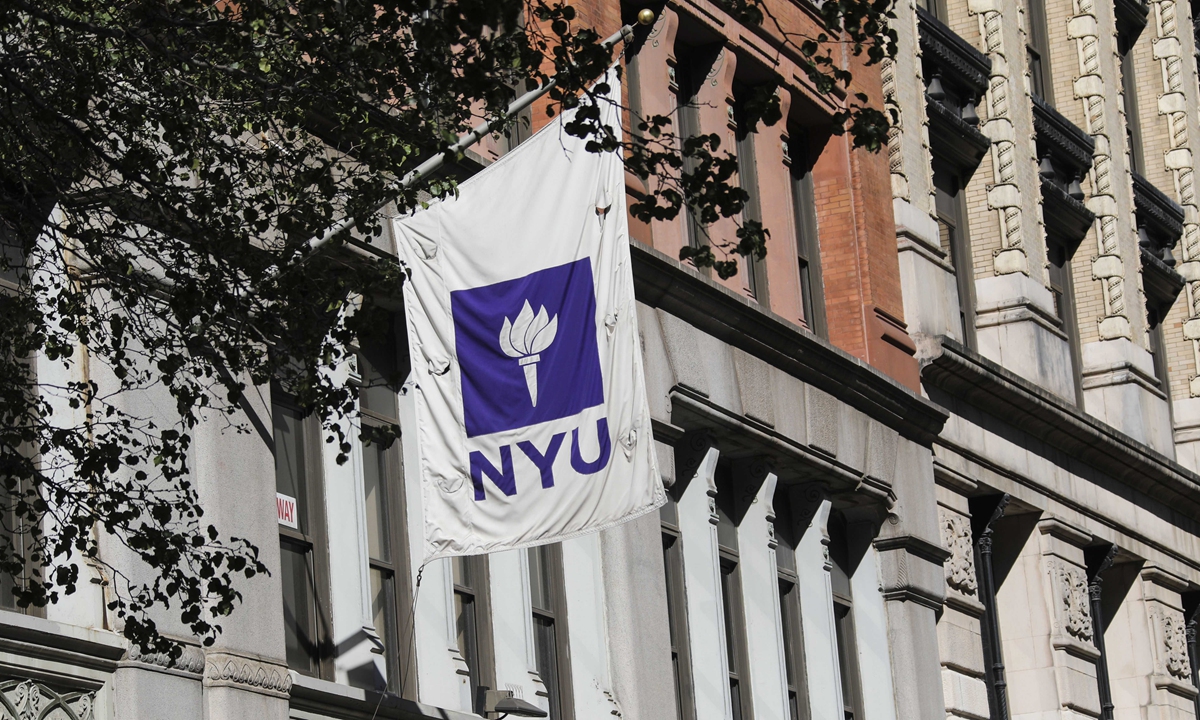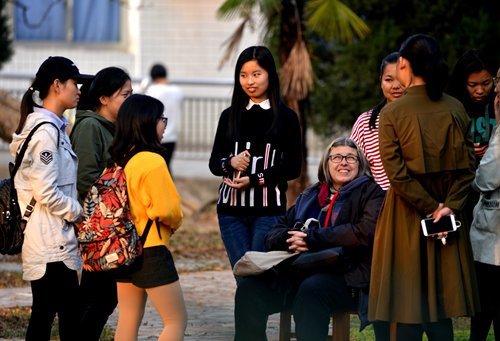US colleges’ make efforts to retain Chinese students under China-US conflicts
By Qi Xijia and Huang Lanlan Source: Global Times Published: 2020/8/5 19:58:40

The New York University Photo: Xinhua
Colleges in the US are offering various education programs in China for Chinese students who are unable or unwilling to travel abroad amid the surging COVID-19 outbreak and escalating bilateral tensions. However, there seemed to be many formidable barriers for both the schools and students to carry out these projects. Experts said US universities are paying for the wrongdoings of the Trump administration.
New York University (NYU) announced a "Go Local" program in mid-July. According to the program, its Shanghai campus will be hosting some 2,300 Chinese undergraduates and 800 graduate students who are currently unable or prefer not to travel to their home campus in New York City or the overseas campus in Abu Dhabi.
The additional 3,100 students will be taught in person at both the NYU Shanghai campus and in WeWork spaces converted into classrooms. They will take online classes offered by their home campuses, according to a reply provided by NYU Shanghai to the Global Times.
Bing, who is a high school graduate from South China's Guangdong Province, got an offer from NYU but was later told she was unable to study at its headquarter because of the serious pandemic situation there. Having decided to accept the university's "Go Local" program, the 18-year-old will study at NYU Shanghai for the next semester, before which she had to look for an apartment herself in the coastal metropolis.
The program is "fine" for her as no better choice is at hand, Bing said. Nonetheless, she said she worries about the quality of the Shanghai-based program, such as the courses it offers being mostly related to economics and mathematics, many of which don't apply to her psychology major.
"I'm afraid that participating in this program though, I may still have to take many online courses," Bing told the Global Times.
NYU Shanghai was established in 2012 through a unique partnership between NYU and East China Normal University. It is one of the three degree-granting campuses of NYU with an enrollment of thousands of students.
Financially dependent
Many US universities are facing a revenue decline due to the potential drop in international students, owing to the continuous spread of the COVID-19 virus and the Trump administration's unfriendly policies, said Ji Hong, a research fellow at the Institute of American Studies of the Chinese Academy of Social Sciences.
More than 50 percent of 520 higher education institutions in the US said they have seen a year-on-year decrease in the number of applications from international students for the upcoming academic year. Roughly 18 percent of them said they suffered a "substantial decline" in applications, according to a survey conducted by the International Institute of Education in July.
In the US, Chinese students accounted for 33.7 percent of all international students in the 2018-19 academic year, according to the Institute of International Education. The US schools got $41 billion from international students that year in total, said NAFSA: Association of International Educators.

The Shanghai campus of the New York University Photo: IC
Several universities, including NYU, Pennsylvania State University (Penn State), Cornell University, Duke University, Syracuse University and University of Pittsburgh, have reportedly developed plans with Chinese partners to allow students to study starting this autumn.
Penn State is offering a 17-week academic program in Shanghai for freshmen students during the fall 2020 semester, Rodger Brindley, a vice provost for Global Programs at Penn State, told the Global Times via an e-mail reply.
There has been a "significant response" of the university's Chinese students to this program, Brindley said.
Chinese students make up roughly half of Penn State's incoming international students, Brindley said. The university had nearly 1,000 Chinese undergraduate students who are enrolled in coursework on campus or through remote delivery of courses as of end-July, according to Brindley.
The efforts by the US universities make sense to Ji, who said US schools are highly dependent on the Chinese market for income and are unwilling to lose it.
It is nonetheless questionable whether their localized programs can guarantee participants equal education content and quality, which makes it difficult to satisfy the Chinese students and their families, Ji said, adding that she personally knows a Chinese student of a US university who chooses to take a year off instead.
Moreover, "in some cases, universities demanding international students to pay equal tuition fees for their localized projects may exacerbate the students' discontent," Ji said.
Online posts complaining of US universities asking to pay same tuition fees as that of the previous academic year are occasionally seen on Chinese social media. On Twitter-like Sina Weibo, a user called her Massachusetts-based university "conscienceless" for charging her the same amount of money for the "Go Local" program, which she thought is not cost-effective.
Bing said she's not sure how much money NYU will charge her for the upcoming offline program in Shanghai. "I'm more worried about whether I can successfully get one of the possible limited quotas of the program," she said.
If I don't (get the quota), I will have to continue taking online courses at home, she sighed.
Inconveniences and barriers
The US' constant shift in policies and rules has been creating a lot of inconveniences and barriers for its international students to study in the US.
The US Immigration and Customs Enforcement (ICE) announced earlier in July that international students may need to leave the US if their universities switch to online-only classes for the fall semester. The rules were rescinded after Harvard and MIT took the ICE to court.

A foreign teacher interacts with Chinese students at an English corner event in West Anhui University, East China's Anhui Province on November 8, 2017. Photo: IC
US universities' "Go Local" projects came out partly as a result of the country's travel restrictions imposed amid the COVID-19 pandemic as well as delays in processing visas due to pandemic-related limitations, Brindley said.
"We recognized the US embassies and consulates were closed around the world, and our Chinese students would not be able to secure visas in time to travel to the US," he said.
The latest policy is Chinese student of US universities will have to be quarantined in a third country before entering the US. A US travel ban says that foreign nationals who have been in China during the past 14 days may not enter the US.
Most Chinese students seem unmoved by this policy concerning the current growing numbers of COVID-19 cases and deaths in the US. "Now I preferring staying in China, a safer place than the US," Bing said.